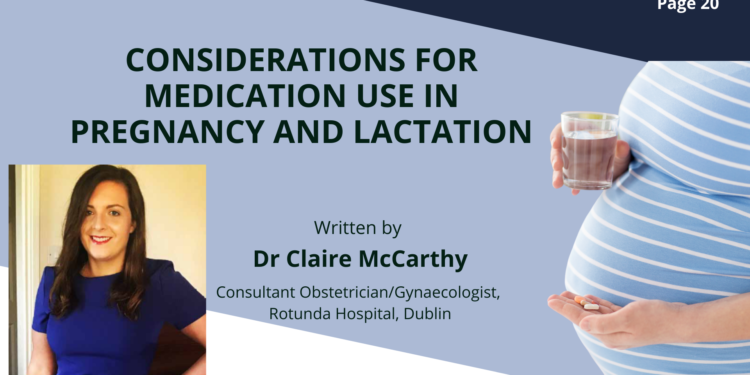Dr Claire McCarthy is a Consultant Obstetrician/Gynaecologist with a special interest in managing medical conditions in pregnancy. Dr McCarthy is also involved with the Irish Medicines in Pregnancy Service (IMPS), a multidisciplinary service based at the Rotunda Hospital, which provides information and expertise to support safe and effective use of medicines before, during and after pregnancy and in lactation.

Written by Dr Claire McCarthy, Consultant Obstetrician/ Gynaecologist, Rotunda Hospital, Dublin
The use of medication in pregnancy and breastfeeding is exceedingly common, with the majority of women taking either over-the-counter or prescribed medication at some point during the antenatal or peripartum period. 1 While some women enter pregnancy with a pre-existing health condition, others develop one in pregnancy or during the postnatal period. It is essential that women and their support networks receive clear, coherent and accurate counselling to support their treatment during pregnancy and in the postnatal period. We know that a well-controlled medical condition in pregnancy is preferable to deterioration of a condition that could lead to maternal and fetal/infant complications. 2
From a breastfeeding perspective, the Health Service Executive (HSE) implores that the promotion, support and protection of breastfeeding are a priority, with additional funding granted to increase lactation consultant numbers in 2021. 3 This is important given lower breastfeeding
initiation rates in Ireland in comparison to other developed countries, with 62.3% of women initiating breastfeeding in 2020. 4 The HSE Breastfeeding Action Plan notes the importance of healthcare provider education in the support of breastfeeding. Community pharmacists consistently top polls as the most trusted group of healthcare professionals, 5 and are often the first port of call for healthcare advice, as well as dispensing of medications. The importance of pharmacist involvement in this is noted in the Competence Framework for Breastfeeding Support, which outlines the minimum level of knowledge that various healthcare providers should aspire to have. 6
It is clear that there are challenges with respect to gathering evidence on medicines in pregnancy, with the majority of information being obtained through studies examining accidental or planned use in pregnancy, or extrapolated from animal studies. As such, the evidence continues to evolve with respect to the use of medications in pregnancy and lactation and it is important to continually evaluate the evidence available and update our knowledge.
When considering medication use in the pregnant or breastfeeding woman, we need to give consideration to maternal, fetal and neonatal physiology. Pregnancy can alter the pharmacokinetics and pharmacodynamics of medications, due to and separate to maternal physiological changes. 7 From an infant perspective, the relative infant dosage (RID) provides an indication of how much of the maternal dose an infant is receiving. 8 This is dependent on factors such as infant age, gestational age at delivery and other maternal factors, but generally an RID of less than 10% is acceptable.
Any discussion on medication use in pregnancy or lactation should be balanced on the risks and benefits, with the risks communicated in a way (i.e. language/ visual/numerical) that is acceptable to the patient, taking into account the clinical perspectives unique to their situation.
There are a wide range of resources available to us when assessing suitability and risk/ benefits of medications in pregnancy. Nationally, the National Medicines Information Centre (NMIC) based at St James’ Hospital in Dublin provides regular NMIC Bulletins and publications (Therapeutics Today) and evidence-based information on medication use in pregnancy and lactation. 9 The IMPS at the Rotunda Hospital provides information for patients attending the Rotunda Hospital for antenatal care, in conjunction with the maternal medicine service. Other hospitals also have medicines information pharmacists who can
provide information on specific medication with respect to medication use in pregnancy and lactation.
Further afield, the LactMed database contains information on drugs that mothers may be exposed to and presents an evidence based review to allow counselling of patients. 10 The UK Teratology information Service provides an online resource in “Bumps” (Best use of medicines in pregnancy) with information leaflets for patients and healthcare providers to guide counselling and choice of therapy. 11 UKTIS, who run the Bumps website, is part of a wider European Network (ENTIS) that provide position statements and publications on a number of different medications in pregnancy. 12 Finally, Hale’s Medication and Mothers’ Milk is one of a number of textbook resources that can be referred to for medication use in lactation. 13 Some of these are available as mobile and desktop applications to allow frequent access.
Pharmacists, obstetricians and neonatologists in maternity units can provide information or evidence on the use of medications in pregnancy and lactation. There are also regular conferences (both physical, online and hybrid) that discuss this topic, such as the Royal College of Physicians of Ireland conference which has a “Medications in Pregnancy and Lactation” Study Day running annually in March.
It is important to acknowledge that the use of medications extends to vaccination in pregnancy and lactation, as we have seen during the COVID pandemic as well as annual influenza seasons, with many women accessing pharmacy services for advice and vaccination. It is essential that pharmacists and staff within the pharmacy can present balanced information to women and their families on this topic, advocating for protection from disease through vaccination. COVID vaccination information and decision aids can be accessed through resources such as the Royal College of Physicians of Ireland. 14
As healthcare providers, it is essential that we empower our patients by educating ourselves and advocating for them and their healthcare needs. This will allow us to continue to offer contemporaneous advice and support in order to manage their acute and chronic healthcare conditions in pregnancy, as well as obtain their breastfeeding goals.
References available on request









